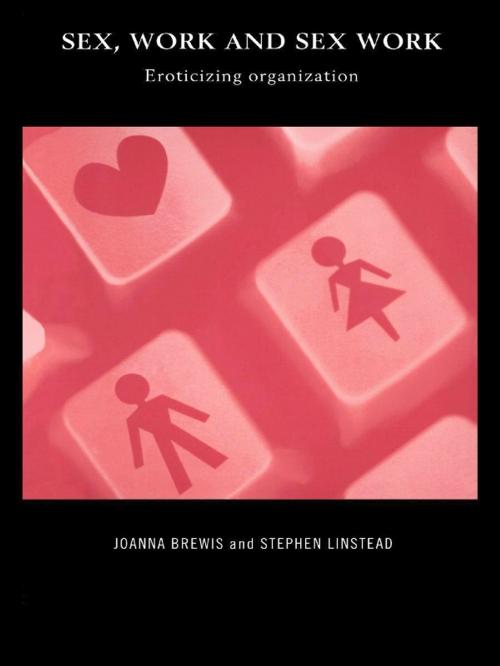Sex, Work and Sex Work
Eroticizing Organization
Business & Finance, Human Resources & Personnel Management, Organizational Behavior| Author: | Joanna Brewis, Stephen Linstead | ISBN: | 9781134621774 |
| Publisher: | Taylor and Francis | Publication: | September 2, 2003 |
| Imprint: | Routledge | Language: | English |
| Author: | Joanna Brewis, Stephen Linstead |
| ISBN: | 9781134621774 |
| Publisher: | Taylor and Francis |
| Publication: | September 2, 2003 |
| Imprint: | Routledge |
| Language: | English |
Sex is much more rife in the workplace than many would think according to this fascinating and controversial new book. It argues that not only does sexuality pervade every aspect of organizations, but also that organization pervades every aspect of our sexuality.
This two-way conceptualization lends the book a two-part structure, covering firstly the ways in which organizational behaviour is shaped through issues such as male managers' experience of violence, organizational constructions of sexual harassment, and professionals who work with sex offenders. The second part of the book examines how sex is organized for commercial purposes, and considers sex work as an industry which can be analyzed as any other, with important insights for normal organizing. Key features of the book include sections on:
* organizing as sexual activity
* connecting desire, the erotic, the abject and organization
* the 'hidden' penetration of organization processes by sexuality
* the 'dark side' of sex and organization and the importance of transgression
* the double effect of discursive and material placing
* organizing sexuality within prostitution
* prostitution as a complex and varied industry.
Fascinating and informative, this controversial book is a valuable source of information for postgraduates and researchers in the fields of business, management and sexuality and gender studies.
Sex is much more rife in the workplace than many would think according to this fascinating and controversial new book. It argues that not only does sexuality pervade every aspect of organizations, but also that organization pervades every aspect of our sexuality.
This two-way conceptualization lends the book a two-part structure, covering firstly the ways in which organizational behaviour is shaped through issues such as male managers' experience of violence, organizational constructions of sexual harassment, and professionals who work with sex offenders. The second part of the book examines how sex is organized for commercial purposes, and considers sex work as an industry which can be analyzed as any other, with important insights for normal organizing. Key features of the book include sections on:
* organizing as sexual activity
* connecting desire, the erotic, the abject and organization
* the 'hidden' penetration of organization processes by sexuality
* the 'dark side' of sex and organization and the importance of transgression
* the double effect of discursive and material placing
* organizing sexuality within prostitution
* prostitution as a complex and varied industry.
Fascinating and informative, this controversial book is a valuable source of information for postgraduates and researchers in the fields of business, management and sexuality and gender studies.















